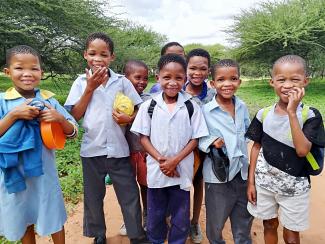
The San people of Botswana have long faced issues of marginalization and poverty. Government pressure on the San risks the loss of our culture as we are pressured to assimilate into the mainstream Tswana lifestyle. San Youth Network, familiarly known as SYNet, is an Indigenous-based organization in Botswana that focuses on the issues specifically concerning Indigenous San youth, as well as San issues in general. SYNet strives to work through networking with San youth from across South Africa, Namibia, Zimbabwe, and Botswana in an effort to mobilize them to make change that matters. It is a growing organization working for San youth development, environmental conservation, traditional knowledge, promotion of human rights and Indigenous Peoples’ rights, Indigeneity, right to self-determination, and access to quality education.
We in SYNet are witnessing rapidly changing societal trends and the implications of these changes on the environment. We advocate for the proper usage of environmental resources and voicing Indigenous knowledge to shed light on the importance of protecting the environment. We are attuned to the knowledge that our culture is diminishing as we continue to face a flood of challenges, such as acculturation and assimilation from mainstream society in Botswana. Cultural maintenance and reclaiming Indigenous land is one of the central themes that SYNet strives to implement. We, the San peoples, have from time immemorial taken custodianship of the Earth because we have a relationship and respect to all living things. We know that development that does not recognize relationships of respect with creation and that does not touch the souls of people is simply killing the Earth and all human beings with it.
Being relatives of all creation, we have no choice but to make our voices heard so that the destruction of the planet and the destruction of our ways of life and diversity can stop. This includes protection of historical sites; education of the youth on Indigenous knowledge systems of conservation; cultural maintenance; documentation of traditional knowledge on hunting and gathering; and facilitation of access to ancestral lands. We face a plethora of challenges ranging from social, economic, political, environmental, and educational inequalities. These challenges cannot be isolated, as their interface is a source of the San’s current struggle to self determination and Indigeneity in southern Africa.
While elders are concerned about this cultural deterioration, San Youth Network is working to reconnect young San people with our culture and to encourage the practices of San arts. Our newest project, funded by a Keepers of the Earth Fund grant, is a workshop that teaches young San people cultural activities such as tracking, healing dances, and San games and songs. This will improve the San sense of community, cultural sensitivity, and values. This partnership with Cultural Survival is a gateway to assist us in establishing creative measures of maintaining our culture, developing a strong reference to San values in defining leadership, reestablishing a synergy between nature and the San youth, conserving our environment in culturally sophisticated ways, and perhaps, in the future, creating community environmental protocols and sustainable resource utilization through better understanding of traditional and scientific conservation techniques.
—Job Morris is founder and executive director of San Youth Network.
